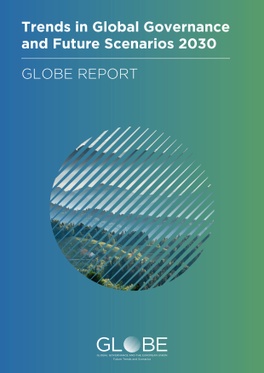GLOBE project spots prospects for global governance facing an uncertain future
The GLOBE research project conducted a survey to more than 1000 staff members from 30 international organizations, revealing trends and challenges for global governance
After four years of research, the project GLOBE just published its final report with intriguing findings on the current situation, challenges, and future steps of global governance. Over the past four years, the researchers investigated trends and scenarios in four main sectors, namely trade, security, finance and the environment.
The research project Global Governance and the European Union: Future Trends and Scenarios (GLOBE) received funding by the European Commission, under the Horizon 2020 Research & Innovation Programme, involved a collaboration of 11 partner institutions all over the world, led by the Institut Barcelona d’Estudis Internacionals (IBEI).
The project included a survey collected from 1004 staff members across 30 international organisations. The investigators identified perceptions, expectations and difficulties that respondents from these organisations face and how these will impact the development of global governance in the future.
Among the challenges examined by GLOBE researchers there are the governing structures of the international organisations, limited resources in funding, or the resistance to change in their processes: “Institutional configurations of global governance are dogged by old structures and designs which were established when globalisation was much less relevant and global policy problems less demanding and less all-encompassing”, confirm the researchers in the final report of the project.
GLOBE researchers, expose the challenges of global governance in the near future. International actors across all sectors are confronted with an ever-so-uncertain future that will most likely require new mechanisms for the successful interaction between International organisations, other global actors and nation-states in a globalized world.
Increasing network creation between international organisations and other global actors -public and private- will be needed, to be able to adapt to a changing environment. For another part, budgetary constraints and fundamental reforms on decision-making and governance structures within their own institutions are needed to be able to adapt to a dynamic interaction in global governance.
Four possible future scenarios for global governance in 2030 were foreseen, based on the findings in GLOBE, and defined as drifting, shifting, rising, and flowing.
The drifting scenario is described as worsening tension between the US and China leading to a major world disruption. The shifting scenario describes an intensifying North-South conflict with unstable alliances. In contrast to that, the rising scenario is defined by the weakening power of nation-states in international affairs, creating space for other actors to rise. The last scenario, defined as flowing scenario, feeds into the latter perspective and assumes a multipolar world with inclusive global governance actions.
The GLOBE researchers agree that future Global Governance will be confronted with a mix of all four scenarios and the challenge remains in estimating how much room each scenario will take in the next decade leading up to 2030 and beyond.
“This report provides an understanding of the directions of global governance, current challenges and prospects in the near future, while considering alternative geopolitical scenarios. Our expectation is that the project results will bring added value to the ongoing discussion on improving global governance”, states Jacint Jordana, Professor of Political Science and Public Administration at the Universitat Pompeu Fabra (UPF), Project Coordinator and Director of IBEI.
International organisations, and particularly member states in the EU, need to confront the reality of their own limitations and outline well-functioning global governance mechanisms to continue leading the way in international cooperation. A document suggesting EU strategies when involved in global governance has been also released.
An in-depth analysis of all the findings and applied methods from the GLOBE project are available in the final report.


